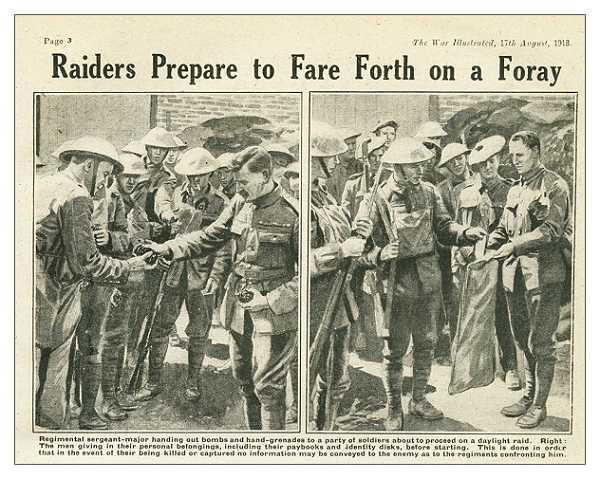|
WW1 soldiers had no sense of time due to officers holding all timepieces. They could only vaguely identify seasons by the weather and tell day apart from night, and relied on whistles from the officers to know what to do. WW1 soldiers would sometimes be forced to make fortifications from all of their possessions, leaving them unarmed and naked in a dirt dugout until they could scavenge supplies from No Man's Land or one of the fellow soldiers they cannibalized for lack of rations.
|
|
|
|
|

|
| # ? May 23, 2024 14:04 |
|
Sometimes WW1 soldiers would rise from their dugouts and immediately lose their bearings so traumatically that they would think they were in the middle of a soccer match, having to be guided back by officers.
|
|
|
|
A World Lit Only by Star Shells
|
|
|
I actually pulled up a PDF copy of the book and found the section:quote:The most baffling, elusive, yet in many ways the most significant dimensions of the medieval mind were invisible and silent. One was the medieval man’s total lack of ego. Even those with creative powers had no sense of self. Each of the great soaring medieval cathedrals, our most treasured legacy from that age, required three or four centuries to complete. Canterbury was twenty-three generations in the making; Chartres, a former Druidic center, eighteen generations. Yet we know nothing of the architects or builders. They were glorifying God. To them their identity in this life was irrelevant. Noblemen had Trying to name everything wrong with this one passage is a challenge in itself, let alone the rest of the book.
|
|
|
|
|
Cessna posted:Did they result to cannibalism due to their lack of 3D vision? Carpathian front was pretty grim, yeah.
|
|
|
|
I have found something that is incredibly this threads poo poo https://store.steampowered.com/app/866400/On_The_Western_Front/
|
|
|
|
zoux posted:A World Lit Only by Star Shells Unironic
|
|
|
|
chitoryu12 posted:I actually pulled up a PDF copy of the book and found the section: How aware was your average wretch of the larger geopolitical goings on in the world when it wasn't marching through their farm land? I mean, there are a significant number of Americans today who can't name the VP so it wouldn't shock me if James "Little James", Son of James didn't know his Urbans from his Innocents. Or maybe that's just more modern chauvinism and people were actually engaged at the time?
|
|
|
|
e: okay so the most obvious thing wrong is that the fact that news was distributed in Latin didn't mean that nobody got it, it meant that there was a class of people in society who knew how to read latin and who's job it was to inform (nay, preach) to the masses.Stairmaster posted:I have found something that is incredibly this threads poo poo Tetris just got real.
|
|
|
chitoryu12 posted:WW1 soldiers had no sense of time due to officers holding all timepieces. They could only vaguely identify seasons by the weather and tell day apart from night, and relied on whistles from the officers to know what to do. Seriously, we're done. Nothing can top these or the post below now.
|
|
|
|
|
chitoryu12 posted:Trying to name everything wrong with this one passage is a challenge in itself, let alone the rest of the book. I'm not a Medievalist, but - FFS. Like I didn't think I could dislike William Manchester even more, but here we are.
|
|
|
|
Porn was invented only as a way to pay soldiers.
|
|
|
|
Yes, Chartres Cathedral took 18 generations to complete, medieval generations being about a year. (The Cathedral was built over the course of about 25 years), and like all medieval cathedrals, (except, for instance, Amiens Cathedral, where the master builders were Robert de Luzarches and Thomas de Cormont, or Notre Dam, where the master builders were Jean de Chelles and Pierre de Montreuil, or Reims, where the master builder was Hugh Libergier), we will never know the names of anyone who worked on it.
|
|
|
|
zoux posted:How aware was your average wretch of the larger geopolitical goings on in the world when it wasn't marching through their farm land? I mean, there are a significant number of Americans today who can't name the VP so it wouldn't shock me if James "Little James", Son of James didn't know his Urbans from his Innocents. Or maybe that's just more modern chauvinism and people were actually engaged at the time? Engagement has little to do with it. The average serf most definitely knew the name of his feudal lord, because the taxes and other services were demanded in that lord's name. They knew the name of their bishop and pope, because those were routinely mentioned in churches. They probably did not know all that much about the whys of politics, but they had some knowledge things were happening or about to happen because those were debated and discussed in cities, and peasants would go there to sell their goods. And we know they had some idea what was happening in the wider world, because we know they would do things like stockpile grain when it seemed a war was likely.
|
|
|
|
The statement that peasants freely ran around naked in the summer could have easily been disproven by Manchester trying to run through a field naked in the summer. I'd imagine he'd make it 10 yards before suddenly regretting the decision, regardless of whether he has a sense of self that encourages him to wear clothes. The cannibalism quote: quote:Typically, three years of harvests could be expected for one year of famine. The years of hunger were terrible. The peasants might be forced to sell all they owned, including their pitifully inadequate clothing, and be reduced to nudity in all seasons. In the hardest times they devoured bark, roots, grass; even white clay. Cannibalism was not unknown. Strangers and travelers were waylaid and killed to be eaten, and there are tales of gallows being torn down—as many as twenty bodies would hang from a single scaffold—by men frantic to eat the warm flesh raw. It also repeats a quote from a contemporary source saying "the English don't drink water except for religious reasons". I think a lot of what Manchester did for the less obviously crazy statements was take firsthand sources as fact and do absolutely nothing to check if they were right.
|
|
|
|
Oh come on.quote:Life expectancy was brief; half the people in Europe died, usually from disease, before reaching their thirtieth birthday. It was still true, as Richard Rolle had written earlier, that “few men now reach the age of forty, and fewer still the age of fifty.” If a man passed that milestone, his chances of reaching his late forties or his early fifties were good, though he looked much older; at forty-five his hair was as white, back as bent, and face as knurled as an octogenarian’s today. The same was true of his wife —“Old Gretel, ” a woman in her thirties might be called.  Oliver Reed in his final role, portraying a 45-year-old man.
|
|
|
|
|
To be fair Ollie Reed is probably not the best example for how to age gracefully
|
|
|
|
That man was a party animal.
|
|
|
|
|
Perestroika posted:With all this WW1 talk, that reminds me of something I was wondering about before: Just how important was the average rifleman during a defensive action? In the stereotypical portrayals, you basically have hundreds of dudes standing shoulder to shoulder in the foremost trench on the firing step with their rifles at the ready to beat off the slavering Hun/perfidious Albishman. But with all this talk about rushing into and out of dugouts and suchlike, it seems like it might be undesirable to need so many dudes to supply the bulk of your defensive firepower. So under that perspective, it seems like it might be a better idea rely primarily on a relatively small number of machine guns to provide your defensive firepower while holding the riflemen back in case of a counterattack. The First World War is mostly about throwing explosives at people. In this context, riflemen, particularly with bayonets fixed, can be only slightly unfairly described as being most useful protecting the guy who's throwing the grenades (this is where that extremely bitter debate about "musketry is overrated" vs "Standards Must Be Maintained" comes from). Trench combat was very often not about hand-to-hand with bayonets and shovels, but bombing fights between two adjacent fire-bays, praying that the other guy's arm got tired or ran out of bombs first; these could go on for many hours or even days at a time. edit: Stairmaster posted:I have found something that is incredibly this threads poo poo I'll be in my bunk
|
|
|
quote:The story was often told of the peasant in the city who, passing a lane of perfume shops, fainted at the unfamiliar scent and was revived by holding a shovel of excrement under his nose. I'm pretty sure Manchester took a medieval joke seriously.
|
|
|
|
|
MikeCrotch posted:To be fair Ollie Reed is probably not the best example for how to age gracefully He’s actually 38 in that photo
|
|
|
|
Cessna posted:I can believe it. You aren't going to be sticking your head out of a trench to take long-range shots at the enemy anyway; they'll just shoot you with a machinegun or a sniper will get you before you get a shot off. And when it comes to clearing trenches on an assault, that rifle isn't going to be taking long-range shots. Instead you'll be using it with a bayonet, or you'll be fighting with grenades, sharpened shovels, and brass knuckles. Actual trench fighting back then was so loving nuts.
|
|
|
|
chitoryu12 posted:I'm pretty sure Manchester took a medieval joke seriously. "The medieval world was fraught with seemingly random acts of violence and terror. One Hungarian peasant reported being stopped by an band of armed Tartars one day. Humiliating, the lead warrior forced the Hungarian to cradle his scrotum while he violently ravished the man's wife. While the modern reader is no doubt troubled by this, the peasant, we are told, experience great elation afterwards for, having deliberately performed his duty poorly, the Tartar had walked away with 'duste on thine ballsack'. Such was the highest victory a peasant could experience in those days."
|
|
|
|
Milo and POTUS posted:Actual trench fighting back then was so loving nuts. From what little I've seen in like all quiet and whatever it seems like complete chaos and a big healthy dose of luck that you didn't get shot/blown up/stabbed in the back while repeatedly hand to hand fighting people.
|
|
|
|
This is clearly bullshit, but an easy example of people being able to figure out who the king was, but also because for the most part outside of a few exceptions like the Emperors of Byzantium, the Medieval Kings would constantly be traveling around their realm with an itinerant court until the tail of the period. Some of the Holy Roman Emperors were pretty much non-stop wandering across their lands from Sicily to Saxony. Look at how many modern people turn out for HoS rallies when they bother to leave the capital.
Jack2142 fucked around with this message at 05:15 on Oct 12, 2018 |
|
|
|
Another thing is that parochial is different than stupid. There's a story about the Decembrist revolt in Russia, that the Decembrist officers had their troops (who were mostly peasant conscripts) cheer the slogan "Constantine and Constitution", and that a bunch of them thought that "Constitution" was the name of Constantine's wife. It's probably not a true story, though. It's probably possible that there were medieval peasants who didn't know who the king was, but most medieval peasants didn't really need to know who the king was. Who the king was, in general, didn't have that much to do with the peasant's life. Part of the problem in looking at premodern governance is that we tend to look at things through the lens of the modern state. It's a mistake, because the modern western state is so much bigger and so much more intrusive than the state was in the middle ages. Something worth reading, although it's not a look at the state in the middle ages, but instead a theory of the 20th century state is Joel Migdal's 1985 book "Strong Societies and Weak States: State-society Relations and State Capabilities in the Third World", which is a look at the role of the state in various Asian, African, and Latin American countries. It's a look at state institutions in rural communities, and how the function of the local state agency a lot of times differs from its intended role. His argument is that you can have a state that, while it claims jurisdiction over a lot of territory, only can really exercise authority over the capital and urban centers. If you go into rural areas, there are strong established local communities and power bases that have traditionally exercised authority, and they can co-opt state functions. So the book looks at the relationship between state power and traditional authority, and how, a lot of times, it's only by breaking traditional power structures that the state can assume authority.
|
|
|
|
Made this ages ago:
|
|
|
|
A statistically significant number of people right now couldn't name their HoS.
|
|
|
|
A Virginia man who was playing a Medieval knight impaled and killed himself with his 7-foot-long lance during a reenactment performance.
|
|
|
|
Alchenar posted:A statistically significant number of people right now couldn't name their HoS. Can't, or don't want to admit it?
|
|
|
|
GotLag posted:A Virginia man who was playing a Medieval knight impaled and killed himself with his 7-foot-long lance during a reenactment performance. Finally found something that's not found in Surviving Edged Weapons.
|
|
|
|
chitoryu12 posted:Oh come on.  Clearly legit. This guy is 27!
|
|
|
|
 the two oldest infantry captains in the ETO discuss tactics and strategy
|
|
|
|
Cessna posted:Did they result to cannibalism due to their lack of 3D vision? That's silly. 3D had been invented almost 50 years ago by then, in the late stages of the American Civil War. They were still working on the "color" thing, though, so it was all black and white.
|
|
|
|
InAndOutBrennan posted:I'm the officer with the sharp haircut. That's not an officer, that's the RSM. He works for a living!
|
|
|
|
I just finished reading Shadow Divers by Robert Kurson, a book about the discovery, exploration, and identification of a previously unknown (or rather, previous believed to have been sunk elsewhere) U-boat off the coast of New Jersey. Focuses a lot on deep-water wreck penetration diving (and how insanely dangerous it is), but also devotes several chapters to the process of research that identified the sub, and the last patrol of the submarine itself. Would highly recommend. I can do a writeup on it if people are interested; for anyone who wants to do their own reading, it's U-869.
|
|
|
|
ltkerensky posted:That's silly. 3D had been invented almost 50 years ago by then, in the late stages of the American Civil War. The colored version was known as 3/5D.
|
|
|
|
Clarence posted:That's not an officer, that's the RSM. He works for a living! There's an O in NCO you know 
|
|
|
|
ToxicFrog posted:I just finished reading Shadow Divers by Robert Kurson, a book about the discovery, exploration, and identification of a previously unknown (or rather, previous believed to have been sunk elsewhere) U-boat off the coast of New Jersey. Focuses a lot on deep-water wreck penetration diving (and how insanely dangerous it is), but also devotes several chapters to the process of research that identified the sub, and the last patrol of the submarine itself. Would highly recommend. Hoisted by its own petard -_-
|
|
|
|

|
| # ? May 23, 2024 14:04 |
|
Clarence posted:That's not an officer, that's the RSM. He works for a living! The RSM, as he will be only too happy to remind you in a very loud voice, is a Warrant Officer Class 1 by rank, and you most definitely will call him Sir, you 'orrible individual.
|
|
|



































